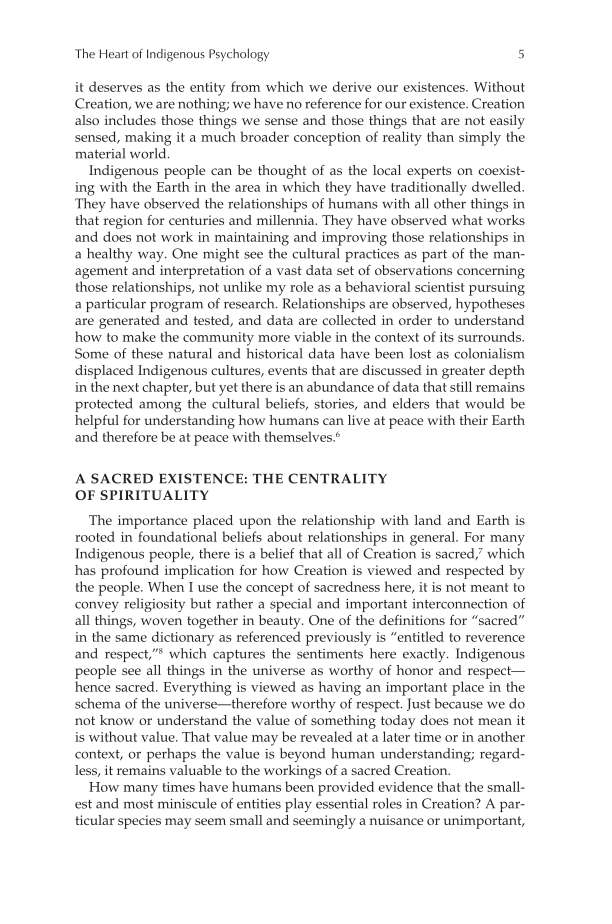The Heart of Indigenous Psychology 5 it deserves as the entity from which we derive our existences. Without Creation, we are nothing we have no reference for our existence. Creation also includes those things we sense and those things that are not easily sensed, making it a much broader conception of reality than simply the material world. Indigenous people can be thought of as the local experts on coexist- ing with the Earth in the area in which they have traditionally dwelled. They have observed the relationships of humans with all other things in that region for centuries and millennia. They have observed what works and does not work in maintaining and improving those relationships in a healthy way. One might see the cultural practices as part of the man- agement and interpretation of a vast data set of observations concerning those relationships, not unlike my role as a behavioral scientist pursuing a particular program of research. Relationships are observed, hypotheses are generated and tested, and data are collected in order to understand how to make the community more viable in the context of its surrounds. Some of these natural and historical data have been lost as colonialism displaced Indigenous cultures, events that are discussed in greater depth in the next chapter, but yet there is an abundance of data that still remains protected among the cultural beliefs, stories, and elders that would be helpful for understanding how humans can live at peace with their Earth and therefore be at peace with themselves.6 A SACRED EXISTENCE: THE CENTRALITY OF SPIRITUALITY The importance placed upon the relationship with land and Earth is rooted in foundational beliefs about relationships in general. For many Indigenous people, there is a belief that all of Creation is sacred,7 which has profound implication for how Creation is viewed and respected by the people. When I use the concept of sacredness here, it is not meant to convey religiosity but rather a special and important interconnection of all things, woven together in beauty. One of the definitions for “sacred” in the same dictionary as referenced previously is “entitled to reverence and respect,”8 which captures the sentiments here exactly. Indigenous people see all things in the universe as worthy of honor and respect— hence sacred. Everything is viewed as having an important place in the schema of the universe—therefore worthy of respect. Just because we do not know or understand the value of something today does not mean it is without value. That value may be revealed at a later time or in another context, or perhaps the value is beyond human understanding regard- less, it remains valuable to the workings of a sacred Creation. How many times have humans been provided evidence that the small- est and most miniscule of entities play essential roles in Creation? A par- ticular species may seem small and seemingly a nuisance or unimportant,
Document Details My Account Print multiple pages
Print
You have printed 0 times in the last 24 hours.
Your print count will reset on at .
You may print 0 more time(s) before then.
You may print a maximum of 0 pages at a time.




















































































































































































































































































